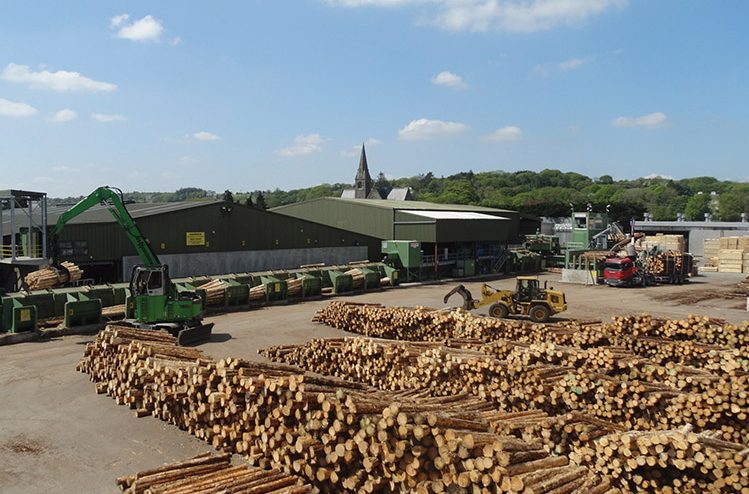
Established in 2013 following the merger of Grainger Sawmills and Palfab, Co. Cork-based GP Wood has established itself as one of Ireland’s foremost timber processing companies with an annual turnover of in excess of €50 million.
To coincide with the 40th anniversary of the original family-run companies, GP Wood completed a €14 million investment programme at its plant in Enniskeane two years ago. Now it is undertaking a similar upgrade of its other sawmill 12 miles away in Lissarda after the site was badly damaged by fire last July.
“When Lissarda reopens in early 2020, we will have two of the most modern and efficient sawmills in the world,” sales manager Michael O’Regan proudly states.
“The fire was a big blow as Lissarda is our primary production mill catering for the construction market, but thankfully we have been able to keep our customer-base satisfied and our supplies up by sourcing some of our products from the Continent while the rebuild is taking place. Our Enniskeane plant was unaffected by the fire and continues to produce construction, packaging and fencing products for our markets in Ireland, the UK, Belgium and Holland.
“One of our main priorities was to look after our customers’ requirements and reduce any supply disruptions, and we have been successful in reorganising our existing production facilities. We have been in business for over 40 years and remain very committed to our loyal customer-base, workforce and the sawmilling industry. We currently employ 145 people directly and another 200 indirectly, who are involved in logging and transport. Once Lissarda is up-and-running again, we will start looking at increasing our workforce. We are extremely proud of our role as a major contributor to the local economy.”
As with the Enniskeane site, Lissarda will house a state-of-the-art saw line supplied by German manufacturer Esterer WD (EWD) which will produce large logs for the Irish construction industry.
“Of the five large sawmills in Ireland, Enniskeane is the only one that has separate lines to produce both large and small logs. We feel it’s more efficient to produce them separately,” Michael adds.
GP Wood’s high output and technologically advanced sawmills are at the heart of its modern timber processing operation which is complemented by extensive kilning, specialise wood machining, planning and preservative treatment facilities, primarily processing native softwoods like spruce and larch. The company’s product range includes timber for construction, timber for pallet and packaging, timber for decking, co-products including woodchips and heat-treated material (ISPM).
Under the stewardship of managing director Niall Grainger and directors Susan Grainger, Donal O’Callaghan and Gerard O’Callaghan, GP Wood is at the forefront of technology and environmental awareness, such as Ireland’s first bio-fuelled Combined Heat and Power Plant. A constant supply of sawdust and bark fuels the plant and produces the necessary heat for its kilns to dry timber while also generating a surplus of green electricity which is fed into the National Grid.
“Every single part of the log is sustainable. Nothing goes to waste,” Michael points out.
“Our logs are sourced from forests accredited by the Forest Stewardship Council (FSC). Co-products such as sawdust, woodchip is used in the manufacture of MDF, paper and chipboard, while bark is utilised as garden mulch.”
GP Wood has a 50% share in a company called Eirebloc which manufactures composite pallet blocks from recycled wood in Lissarda. Founded in 2008, Eirebloc continues to expand and has customers as far away as Africa, Central America and North America.
GP Wood’s two key relationships are with its suppliers and customers. When you place an order, you are initiating a business relationship with people who genuinely value their customers. The company is committed to a high level of customer satisfaction and building on long-term relationships.
A leading supplier of top-quality structural timber and pallet and packaging to the Irish construction sector, GP Wood has enjoyed a very successful first five years in business. The coming together of the Grainger Group, which was run by the Grainger family in Enniskeane, and the Palfab Group, which was operated by the O’Callaghan family in Lissarda, has enabled GP Wood to become one of the country’s premier timber processing operations.
“The merger has worked out really well,” Michael explains.
“It coincided with an improvement in the market after the difficult years of the recession and has gone on to exceed all expectations. When you marry two companies, there is always a risk involved, but both the Grainger side and the Palfab site pre-planned meticulously in the lead-up to the merger in April 2013 and those preparations paid dividends.
“The reason for the merger was to put down the foundations for growth and to capitalise on the potential in both companies, and we have certainly achieved that. In 2013, €4 million was invested in the upgrade of the Lissarda site and Enniskeane was completely revamped at a cost of €14 million four years later. And now, by accident rather than design, we are getting a brand new facility in Lissarda which will only strengthen our position as Ireland’s largest supplier of sawn softwood products.”
Most of the wood used by GP Wood is sourced from forests managed by state forestry agency Coillte.
“About 70-80% of what we produce is from Coillte,” explains managing director Niall Grainger.
“Sometimes we buy blocks of forestry and sometimes we thin a forest, take one tree in every three. For every tree we cut down, three more are planted so that it is sustained. We have accurate forecasting in place to 2035. The raw material is our biggest cost, followed by transport. We deal in a very low margin area so we deal in high units.
“We are a family-run business with a big-company attitude.”
GP Wood,
Main Street,
Enniskeane,
Co. Cork.
Telephone: 023 8822500
Fax: 023 8847698
Email: [email protected]
Web: gpwood.ie
Taken from Building Ireland Magazine, March/April, Vol 5 No 3